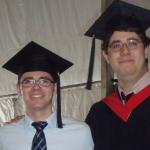Musings from Students of the Pardes Institute of Jewish Studies in Jerusalem
Posted on December 5, 2014 by David Wallach
Night Seder Chevrutas Binyamin Cohen and David Wallach join together to reflect on this week's parshah.

“In the middle of the night he got up, and took his two wives, his two handmaids, and his eleven sons, and sent them across the Jabbok River shallows.” (Gen. 32:23)
Jacob’s life is a story of mistakes, misfortunes, and wrong turns, albeit often brought upon him by himself. As we open this week’s parshah, we find him and his family preparing for a confrontation with Esau. He goes through an elaborate series of steps in order to do so, which reaches its height with fistfight with a celestial being. We typically assume that Esau has evil intentions, and that Jacob is doing the right things. But Rabbi Shmuel ben Meir, the Rashbam (Rashi’s grandson), flips this on its head. Jacob misinterprets the entire situation. Esau has gotten over his anger; he is coming to meet Jacob with an honour guard of four-hundred men, to greet his brother with joy.
Jacob reacts with fear and a lack of faith. His mistakes are two-fold: not only does he misunderstand his brother’s intentions, he also does not trust in God to keep him safe through the ordeal. He splits up his family and followers, and in the crowning mistake of the whole trial, he fords a river at night! His uncertainty put him and his whole family in danger. So it might come as no surprise that divine punishment in the form of a divine attacker comes upon him when he is alone on the riverbank.
However, Jacob’s encounter with this being ends in the opposite way to what one would expect of some kind of punishment. It ends with Jacob receiving a blessing and a new name, no small reward. How, after all his dreadful mistakes, can he possibly be rewarded so greatly? Not only that, his reward is a lasting legacy for his people. We sometimes forget that Jew, יהודי, really just means someone from the tribe of Judah, יהודה. The Jewish people are really the Children of Israel, בני ישראל. Jacob’s new name, Israel, means struggling with God. The blessing, and its manifestation through Jacob’s name change, teach us an important lesson.
What does it mean to struggle with God? Further, what does it mean that this struggle is a blessing?
If we think of struggling with God as perhaps the internal struggles that many individuals go through in their lives (crises of faith, emotional troubles, and the like), we can see this as the way in which our terrestrial minds process our Divine creator.
But how is this a blessing? To be clear, the blessing was not a casual part of the messenger’s farewell; rather, Jacob demanded it before he left
כז וַיֹּאמֶר שַׁלְּחֵנִי, כִּי עָלָה הַשָּׁחַר; וַיֹּאמֶר לֹא אֲשַׁלֵּחֲךָ, כִּי אִם-בֵּרַכְתָּנִי.
And he (the messenger) said “Let me go for it is day break.” And he (Jacob said) “I wil not let you go until you bless me!” (32:27)
Commenting on this verse, Rabbi Kalonymus Kalman Shapiro, the Piaseczner Rebbe, explains that Jacob demanded a blessing from his adversary so that his descendants would know that when you struggle, and win, it is more than just winning; you gain something valuable from the experience. Jacob, or Israel, was setting the standard for his Children. He was telling us that, despite your mistakes, if you work through your struggles, if you fight with them until the sun rises once again, you must not leave them behind without reaping something positive from them. We must all, in our lives, not only find the good within the bad, but struggle for it, strive for it.
It is one of our special destinies as the Children of Israel to rise to this challenge, and to overcome it, and to gain blessings from it. Our ancestor Jacob, despite his many mistakes and struggle-filled life, was invested in his children, invested in making sure there was light in their future. He struggled with the angel until dawn, and demanded a blessing, so that the Children of Israel know that there is Light at the end of all our struggles, and that we must seek out the blessings, demand that our struggles give us them. If we cannot find the blessing in our struggles, were they really struggles at all?
Shabbat Shalom!
Based on Rashbam’s Torah commentary, Esh Kodesh by Rabbi Kalonymus Kalman Shapiro, and Neima Novetsky’s Chumash class.